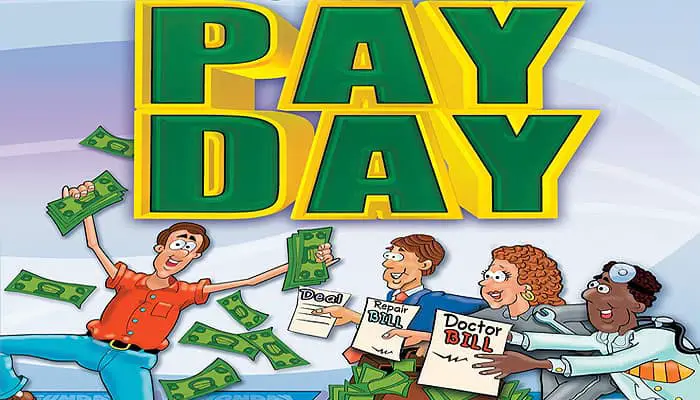

Components
- Pay Day game board
- PAYDAY money
- 48 Mail cards
- 24 Deal cards
- 6 Tokens
- 1 Die
- Loan record pad
Object of the Game
To be the player with the most cash at the end of the game after playing through one or more months.
Setup
-
Decide how may "months" you'll play: How many times will you go through the calendar from Monday the 1 st to Wednesday the 3 1 st?
Note: We recommend a minimum of 2 months.
With 4 players, a 3-month game takes about one hour, a 6-month game about 2 hours.
-
Shuffle the Mail and Deal cards separately, and put each stack face down in Draw piles near the board.
Note: Discarded Mail and Deal cards will be placed face up in a pile next to their respective stacks. When a Draw pile is depleted, shuffle the discards and use them.
-
Take the top Deal card and slide it, face down, halfway under the left edge of the board next to the "Yard Sale" space and under the "Deal" sign.
-
Each player picks a token and places it on the Sunday START space.
-
Pick one player to act as the Banker, who is responsible for all money that goes in or out of the Bank. The Banker begins by giving each player $3,500 in these denominations: two $1,000 bills, two $500 and five $100.
-
Pick another player to be the Loan Record Keeper, who is responsible for keeping track on the Loan Record Pad of all Loan transactions. He or she begins by writing the players' names across the top of the pad; for six players, use two sheets.
-
Pick a player to go first. (The Banker and Record Keeper both play). Play passes to the left around the table.
Deals & High Finance
As any financial advisor will tell you, the way to get ahead financially is to make Deals. It's the American way! So take advantage whenever you can.
The time will probably come when you don't have enough money on hand to buy a Deal-or to pay your bills, pay a neighbor, or make a charitable donation you are instructed to make. So do what any red-blooded American would do: Take out a LOAN!
Loans
You may take out a loan at any time. The Banker gives you the money, and the Loan Record Keeper notes it on the pad.
Loans must be in increments of $1,000.
You will be charged 10% on your outstanding loan balance every time you land on "Pay Day".
On "Pay Day"-but at no other time during the month-you may pay off part or all of your loan. If you pay off part it must be in $1,000 increments.
Recording Loans: Whenever a player takes out a new loan, the Record Keeper updates the loan record by crossing out the old amount and writing in the new total.
Game Play
On your turn:
Roll the die and move your token that many days along the calendar. (Use the track like a real calendar: Sunday to Saturday, then Sunday to Saturday again, etc).
Follow the instructions on the space you land on; see the detailed explanations below. Your turn ends when you've finished doing what you were told!
The Mail Spaces and Cards

If you land on a MAIL space, draw the number of Mail cards indicated on the mailbox flag.
If instructed, act immediately; otherwise, keep them in a stack face up in front of you until you land on "Pay Day"-when you must pay your bills, and discard the Mail cards.

Pay a Neighbor:
As soon as you draw this, pay a player of your choice the amount shown on the card, even if you're forced to take out a loan.

Mad Money:
As soon as you draw this, collect the amount shown on the card from a player of your choice. That player may have to take out a loan to cover the payment.

Charity:
Place the amount shown on the card on the corner of the board marked "Jackpot".
Monster Charge:

If you don't want to pay off the whole balance on Pay Day, you must pay the interest-l0% of the total amount owed-then you can carry the balance over into the next month.
You may not pay part of the balance on Pay Day: Pay the interest, or pay the interest plus the total charges.

Deal/buyer:
Move to your choice-a Deal or a Found a Buyer space- and follow the instructions below.
Move ahead to the next Deal or Buyer space NOW
The Deal Spaces and Cards

If you land on a Deal space, draw the top Deal card. If you wish, you may purchase the item on the card immediately; take out a loan if you need to. Pay the bank.
At any one time, you may have as many Deal cards in front of you as you can afford, so if you're feeling flush, buy a Deal. Dipsydoodle Noodles, for example, will cost you $8,000.

Hold your Deal until you land on (or are sent to) a Found a Buyer space, when you may cash in the card for the increased value. The bank pays you. Dipsydoodle Noodles will get you $12,000-for a profit of $4,000!
You may sell only one Deal at a time, and the Deal card has no value if it's unsold when the game ends.
The Other Board Spaces

Sweepstakes:
Collect $5,000 from the Bank.
Lottery:

The Bank antes up $1,000, then each player may ante $100; it's not mandatory. Starting with the player who landed here, each player who anted in turn picks a different number from 1 to 6.
The player who landed on the Lottery rolls the die: The player whose number is rolled collects all the money. If no one had picked the number rolled, keep rolling until somebody wins!

Fun Day
Put the amount shown onto the Jackpot corner of the board. (If you don't have the cash, take out a loan).

Radio Phone-in Contest:
Starting with the player who lands here, each player rolls the die. The first one to roll a 3 "wins" $1,000 from the Bank!

Found a Buyer:
If you have one or more Deal cards and land here, the Bank pays you the "Value" amount on one of them (your choice) and you pocket the profit! Put the used card in the discard pile.

Happy Birthday:
Every player gives you a lovely present: $l00!

Yard Sale:
Pay the Bank $100 x the number you rolled and take the Deal card that' s under the edge of the board-it' s yours! Replace it with a new one from the Deal deck.
Walk for Charity:

All players except the player who landed here roll the die and place $100 x the number they rolled onto the Jackpot corner.
Example: You roll a 4. Since 4x100 is 400, you place $400 in the Jackpot. Take out a loan if you have to.

Jackpot:
Any player who rolls a 6 on his or her regular turn collects the Jackpot! (A regular turn consists of rolling the die and moving your token). If you don't remember, you' re out of luck.
Pay Day:

STOP! Stop here, even if you rolled a number that would take you past this space. Just like real life, getting paid has its advantages-and disadvantages. Here' s what you do in this order:
Collect your monthly salary of $3,500 from the Bank.
If you have taken out a loan, you must pay 10% interest to the bank.
If you wish, you may pay off part or all your loan. Payment must be in $1,000 increments. The Loan Record Keeper records the transaction on the pad.
Pay off all the bills you received this month. If you don't have enough cash, take out, or increase, a loan. Put your paid bills in the Mail card discard pile.
Move your token back to START. On your next turn, you' ll start through the month again.
At the end of the last month of play, discard any Deal cards you still hold.
Note:
If you have reached Pay Day of the last month of play (according to the agreed-upon number of months), you retire from the game and wait for all the other players to finish. While you' re waiting, you may play the Lottery, Radio Phone-In Contest, Happy Birthday, or Walk for Charity, if one comes up!
End of the Game
When all players have completed the agreed-upon number of months, each player tallies his or her cash total. Obviously, you will be completely paid- up on all bills because you paid them off on Pay Day. Now subtract the amount of any outstanding loans. The amount you have left is your net worth.
The player with the highest net worth - the most cash - when all players have landed on Pay Day for the last time, wins the game.
For poor money managers: If all players end the game in debt (with bills or loans outstanding and no cash to pay them), the player with the lowest amount of debt wins!
Continue Reading


